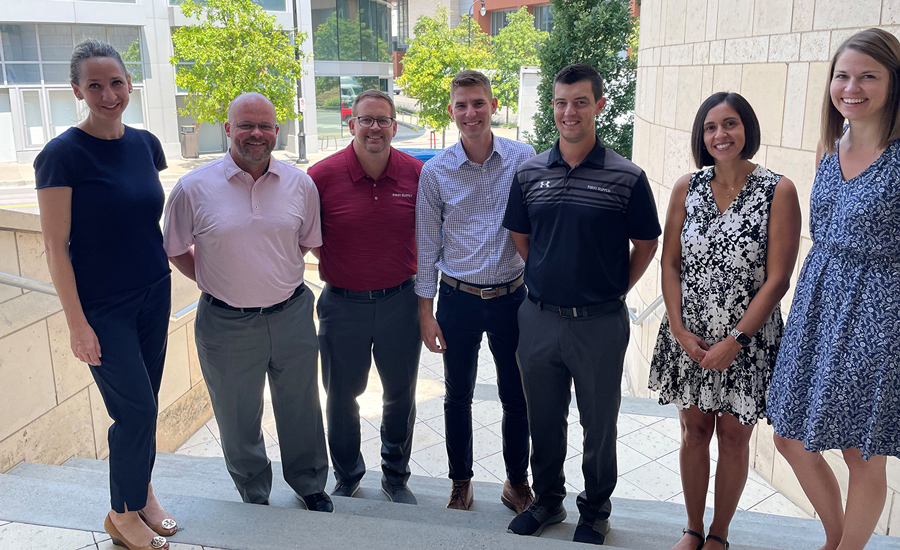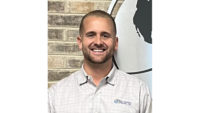Next-gen tells all
Members of ASA's Emerging Leaders division discuss hot-button topics at recent roundtables and panel discussions.

EMERGE attendees had the opportunity to participate in two separate roundtable discussion with groups of reps, distributors and manufacturers. Photo by Mike Miazga.
There’s no better way for distributors, manufacturers and reps to strengthen relationships than to gather together and discuss the most hard-hitting topics facing the PHCP-PVF supply chain today. In August, ASA’s Emerging Leaders’ division annual conference, EMERGE, did just that, providing both scheduled and free-time networking opportunities for the under-40 crowd.
On day one, the conference wasted no time, jumping into a panel discussion where David Chisholm, vice president of marketing for A. O. Smith, Dan New, president of Mid-City Supply, and Tim Morales, president of Tim Morales & Associates each shared their unique perspective on several important issues.
In addition to the panel discussion, the more than 150 attendees participated in two roundtable discussions where reps, manufacturers and distributors were strategically grouped — to avoid being placed with competition — to discuss hot-button topics such as customer expectations, adoption of e-Commerce, material shortages and price increases, labor concerns and more.
Remaining relevant in today’s marketplace
During the panel, Mid-City’s New kicked things off saying for distributors to remain relevant, it’s all about adding value.
“We often think of adding value to our contractor customers, but it’s equally important that we work to add value to our manufacturers as well,” he said. “They always have the choice to sell direct to the customer, so as distributors we need to be constantly working to add value to the vendors’ salesforce and be willing to make changes from what worked in the past in order to move towards the future.”
From the rep perspective, Morales spoke about passion and empowering the people you’re working with. “We must proactively reach out to our distributor partners to share the market insight we have with them,” he said.
Chisholm added that A. O. Smith strives to be more than a manufacturer, again echoing the importance of adding value — specifically additional services and resources — in order to remain relevant in today’s market.
Tara Scanzillo, director of national accounts at Apollo Valves, said doing everything with purpose is a key to remaining relevant. “The days of milk runs, or just stopping by to chat are gone. Everyone is running leaner than ever and each touchpoint needs to have direct purpose and reason,” she explained. “There is no time to waste. The importance of rich content (online and physical), needs to be able to sell on its own, as the speed that information needs to be available doesn’t always allow for an actual salesperson to be there to aid the sale.”
Michael Field with New Jersey-based Barton Supply said the market is always changing, but the fundamentals of relevancy stay the same. “Customer service, support and inventory are the keys to remaining relevant to customers,” he said. “All three of these things are constantly changing but the core fundamentals of them always stay the same.”
Cary Caldwell, southeast regional manager for Liberty Pumps, said it’s all about service. “Deliver on service. Do what you say you’re going to do and always give a little bit more to the customer than they were expecting. With a world-class focus on service, the sales should follow. Make your company known for being one that will do anything for its customer.”
With a changing marketplace comes changing customer expectations. John Hockley, purchasing manager for WHCI Plumbing Supply, a Hajco Company, said customers are expecting more readily available information.
 Madison, Wisconsin-based First Supply sent a large contingent to EMERGE2021 in Nashville. From left: First Supply President and CEO Katie Poehling-Seymour, Sean Robert Lamb-Vosen, Seth DePuy, Matt Durtsche, Bryan Lynch and Staci Otradovec. Photo by Mike Miazga.
Madison, Wisconsin-based First Supply sent a large contingent to EMERGE2021 in Nashville. From left: First Supply President and CEO Katie Poehling-Seymour, Sean Robert Lamb-Vosen, Seth DePuy, Matt Durtsche, Bryan Lynch and Staci Otradovec. Photo by Mike Miazga.
“Customers want images or access to images of the products they are thinking about ordering,” he said. “The behavior change of shopping online more during the pandemic has raised expectations about the amount of product data, specs and images that should be available to them.”
Scanzillo agreed, saying the importance of content has never been greater. “The speed information is needed is faster than ever,” she said. “The new generation of workers likes everything on their phones or the internet. We are a bit behind in this segment, but I think COVID pushed forward initiatives to fast-track new websites and rich online content.”
In some cases, attendees said customer expectations are lower due to the current disruption.
“Customers are so bombarded with price changes and lead time increases that general acceptance has come up more often,” Caldwell said. “We as a Plumbing/HVAC society are resilient and doing everything we can to take care of our contractor communities. Caution is exercised on job quotes and job starts. Allocation is something I bet a lot of people never thought would be in place, but now it’s happening often. We must maintain focus and understand that this situation of supply constraints is only temporary and the invisible hand of the free markets will correct our current path forward.”
Field agreed, saying at Barton Supply customers have always expected materials to be in stock and delivered quickly, but expectations are dwindling as customers learn more about the availability of material across multiple industries.
Online competition and opportunity
No surprise to attendees, Amazon was mentioned throughout the online competition discussion. Mid-City's New pointed out that distributors should be thinking: What can we do that Amazon can’t?
“I believe this is still a people business, but for how much longer?” New asked. “In order to understand how to compete, we need to know why customers choose us vs. going to Amazon; don’t be afraid to ask your customers this question.”
Chisholm added that it’s all about making sure available product is as close as possible to where it’s needed, and asked the attendees to think about things the industry can learn from Amazon to leverage for its own growth.
Morales said reps understand that distributors are under pressure to compete online, so Tim Morales & Associates' strategy is to find out how reps can help.
Caldwell said he’s seen success in companies that take an Omni-Channel approach, utilizing both online sales and brick-and-mortar stores.
“E-commerce is here to stay. With many years working in the retail industry, I saw the online marketplace always taking a little bit more market share every year,” he said. “What has been proven to work for most companies is to adopt an Omni-Channel approach of doing business. Utilizing brick-and-mortar stores to fulfil orders quicker and allow a customer to pick up material should they choose or have it delivered utilizing a store’s shipping capability.”
Unprecedented supply chain status
Perhaps the most anticipated topic — supply chain disruption — was centered on the importance of transparent communication. “Even when we don’t know exact lead times, ’no’ isn’t an appropriate answer for our customers,” New said. “Distributors and manufacturers have to communicate more than ever to provide the best possible situation for jobs.”
Caldwell noted that Apollo has implemented additional meetings internally and with distributors to better plan, prepare and communicate upcoming disruptions. “The importance of clear communication is greater than ever. Supply chain issues are hurting everyone. We need to be looking forward and planning four-to-six months out, rather than our historical dependency on ERP systems or past demand driving production and planning.”
Michael Maloney, executive vice president at Coburn Supply Co. and current ASA Emerging Leaders chairman, joined the conversation, pointing out that the communication described above defines partnership. “This type of communication between manufacturers, distributors and reps defines what our strong partnerships are about,” he said. “It’s all about telling each other what we know what we don’t know, working together for the best outcome.”
Strategies for a tight labor market
The panel members also had conversations around personal and human resources, discussing how to navigate the tight, short labor market at hand. New explained that searching for hires in the current climate forces companies to look inward at wages and compensation. “A leadership team that is open, honest and willing to have difficult conversations makes for more comfortable employees,” he said.
Chisholm added that through the past 18 months, companies should have focused on supporting employees through times of heightened demand. “If we’ve learned anything, it’s the importance of flexibility and understanding,” he said. “Take a look at and rigid policies you have in place and reevaluate to better support your people; treat them as people first.
I encourage you to look at work differently, and measure results instead of input, meaning you look at overall performance, not just time spent at a desk or on the road.”
Field agreed, saying treating employees with compassion, respect and offering competitive wages are keys to attracting and retaining. “We should work on being the best companies we can be in order to attract the next generation,” he said. “Additionally, we need to advertise the strength and stability of the sector. It is long-term employment with tons of growth potential.”
In-house management tracks were a popular topic discussed among attendees. “Management programs allow the industry to get young, smart people and provide them with an opportunity to grow, gain industry experience, and lead,” Hockley said. “In return, the company gets an in-house young management pipeline.”
From the manufacturers’ side, Caldwell said advertising ease-of-install is important. “As Emerging Leaders, we need to educate the next generation that a pipe wrench will make you more than a trending post on social media,” he said. “As manufacturers, we need to educate to the younger generation that our products are easy to install and easy to use. This will require trainings needed at trade schools, in the field, counter days, online videos and customer testimonials.”
 ASA Emerging Leaders Chairman Michael Maloney (left) and A. O. Smith’s David Chisholm after ASA honored A. O. Smith with an award thanking them for continued sponsorship and investment in the Emerging Leaders. Photo by Mike Miazga.
ASA Emerging Leaders Chairman Michael Maloney (left) and A. O. Smith’s David Chisholm after ASA honored A. O. Smith with an award thanking them for continued sponsorship and investment in the Emerging Leaders. Photo by Mike Miazga.
Greatest takeaways
Attendees left EMERGE with minds full of fresh perspectives and ideas.
“There is no company that is perfectly managing the fallout of the disrupted supply chain,” Hockley said. “Organizations can always strive to be better, but perfection is not realistic in this environment. Instead of a just-in-time inventory strategy, adopt a just-in-case inventory strategy, while managing customer expectations.”
Both Field and Caldwell said they left the event understanding that everyone is experiencing demand that is outpacing supply.
“We are looking at a very sensitive supply chain and factors that have never been truly factors before,” Caldwell said. “We need to make sure we are communicating lead times and drawing up solutions in real-time to stay relevant in the markets we serve.”
As a first-time attendee, Scanzillo said she enjoyed hearing from all levels of businesses and meeting folks she wouldn’t ordinarily get to interact with. “It was great to have manufacturers, reps and distributors sharing perspectives openly,” she said. “Hearing from everyone that we are experiencing the same struggles helped me step back and understand that business as a whole is changing rapidly.
I hope we bring more team members next time so more levels of our organization are represented and present to learn.”
Looking for a reprint of this article?
From high-res PDFs to custom plaques, order your copy today!






